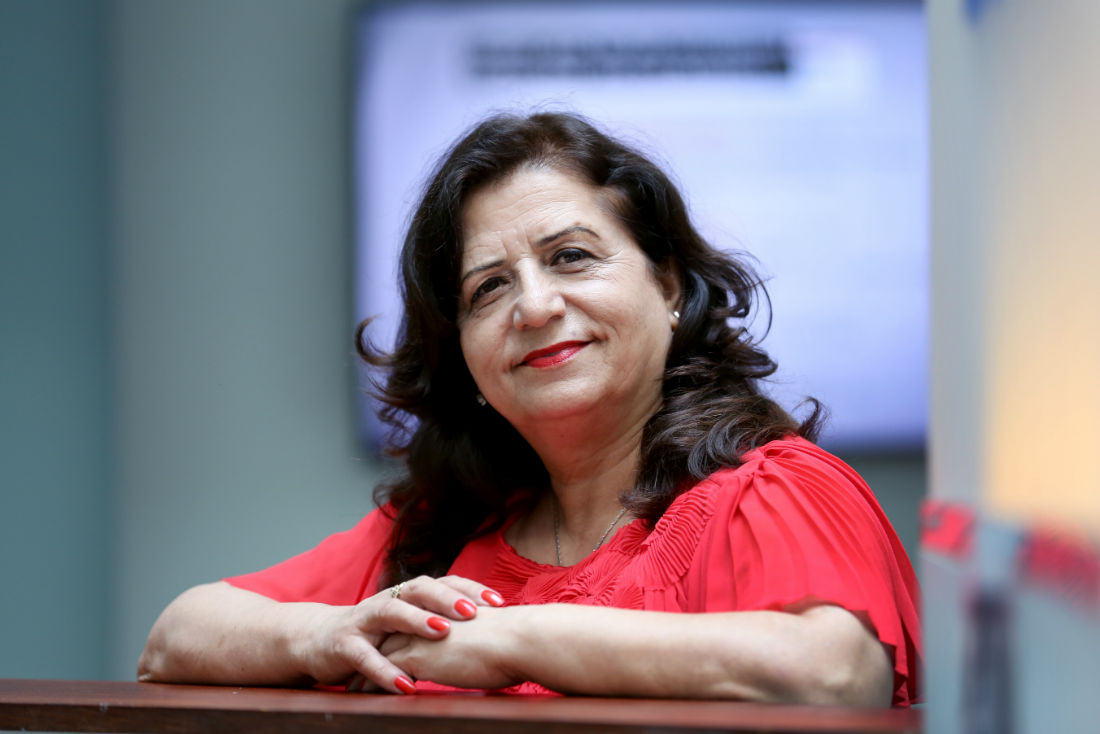Sarah Ahmadi
The Story behind the AMIF project

Since then, she has dedicated her life to helping refugees, asylum seekers and the BME community to do the same, making a fulfilling life for themselves here in the North East and contributing to society. Today, she is Project Leader of the AMIF Project. Working closely with the BIC’s social enterprise team, the project aims to support migrants to fulfil their potential when they arrive in the UK.
When asked what she has learned from her experience with the enterprise, she says: “When I came here, I had nothing but the clothes I stood up in. Now I’m in a position to help others reach their potential and contribute to society. The experiences we have gone through make us strong and determined, and we have so much to offer.”
Q. How has your personal experience formed you?
It has made me incredibly strong. I had to overcome so many obstacles just to survive in my own country. I had to go against the odds to even make it out alive. When I arrived in Sunderland, I knew nobody and spoke very little English. For a while I did nothing but cry – I was so lonely and afraid. But I knew I couldn’t go back and I became determined to make good things happen because I knew I had a lot to offer. My Visa was refused at first but thanks to my career status, qualifications and profession, I was given an exceptional Visa for four years. I then got British Citizenship in 2006.
Q. Why do people in the region need AMIF?
The project serves the needs of refugees – those who have migrated from their countries due to conflict in search of a better quality of life in the UK as well as safety and security. Many of them hold higher level qualifications in various fields, however on arrival to the UK they end up in menial labour work due to the language barrier.
The project helps them to integrate into their new surroundings while improving their English and gaining a clear understanding of British culture and values. They learn about job skills and have the chance to explore any entrepreneurial ambitions they might have to start a business, with expert support from the social enterprise team at the BIC. This project is funded by the EU Asylum, Migration, and Integration Fund (AMIF) – hence the name.
Q. What lies behind the project’s success?
It’s successful because it is designed by someone who really understands the unique challenges and opportunities. We help with really fundamental things like getting an email and getting online, making friends and creating a community. This all helps with the transition from their former life into a new life. Some are very highly skilled doctors and lawyers and we find out exactly who they are, what they want to achieve and what gaps need to be filled. We could tell it was going to be a success when word started to spread through communities and people started recommending family and friends. If something is good, people will find out about it!
Q. What brought you to the UK?
All was well with my life and career until the 1990s when tensions began to rise and conflict broke out in Afghanistan. My professional background is in media and culture and I started in radio at the age of eight as a presenter on a children’s programme in my home city of Kabul. After university I went on to become a well-known face on national Afghan TV, as well as a university lecturer. I was also the Chair of the Afghan Women’s Education Centre and Chief Editor of a magazine called Women. When the conflict began to escalate, Afghanistan was not a safe place for women. As a strong advocate for women’s rights I was particularly vulnerable, so I had to flee for my own safety. I came to the UK as an asylum seeker in 2002 with the hope of making a better and safer life for myself.
Q. How did you begin to rebuild your life when you first arrived here?
I knew education was the key to integrating into society and making a good quality of life for myself in the UK. With no family or friends to support me, I spent all my time educating myself, learning English and gaining IT skills. I completed a masters and PGCE qualification in education at Sunderland University. Driven by my own experience of being an asylum seeker and the prejudice I faced, I pledged to educate myself to the highest level I was capable of to not only improve my own life, but also to make a difference to others in a similar situation
Q. When did you begin to help others?
First, I set up a charity called the Afghan British Association in 2004 to serve the needs of ethnic minorities. Then in 2007 I set up United Community Action to focus on improving the lives of ethnic minorities through various projects and courses aimed at developing their language skills and providing them with knowledge of local life, culture and British values. I delivered a successful project with the BIC in 2018 and that led to our most ambitious project to date, which is AMIF, which is named after its funder – the EU Asylum, Migration and Integration Fund.
Q. How do you feel when you consider how far you, and the people you’ve helped, have come?
When I came here, I had nothing but the clothes I stood up in. Now I’m in a position to help others reach their potential and contribute to society. The experiences we have gone through make us strong and determined, and we have so much to offer. There’s nothing better than hearing the success stories of those we’ve helped. I feel so proud of what we’ve managed to accomplish.